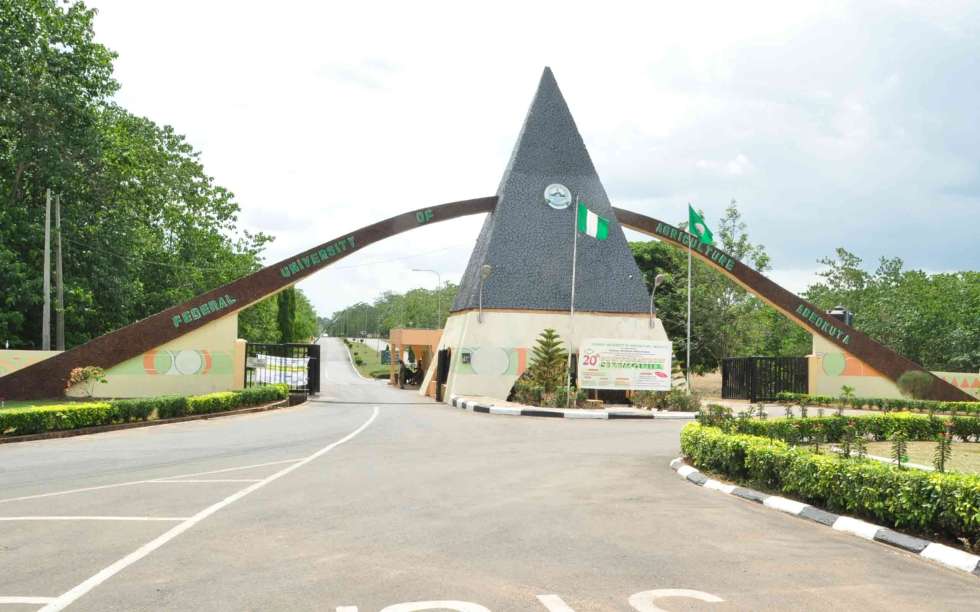Educational Issues
Scrapping of Management Sciences in Federal Universities of Agriculture Across The Country Not Ideal -By Albert Ijika


I thought it wise to lend my voice as a patriotic Nigerian. More so as the matter is more sensitive than most people think.
This is in the hope that this will get the attention of the Ministries of Education and that of Agriculture and Rural Development.
I believe that people disagree to agree. When we are humble, with teachable heart, to listen to one another, we come out of any misunderstanding stronger and better informed with a better and collective view point to rest the matter in question. This happens when we exercise restraint /patience and agree to listen to one another, even to the foolish or seemingly foolish ones. Misunderstanding sometimes is simply seeing one thing persistently from different perspectives/angles by different persons. Learning to view the contentious subject matter through the other opponent’s eye glasses helps to resolve the matter quickly.
The decision to scrap Management Sciences from Universities of Agriculture nationwide, in all honesty/intent, was borne out of the zeal by the current handlers/policy makers to put the nation back on track, in tandem with President Buhari’s determination. If we are objective and honest enough, we should admit that Nigeria has suffered misrule by successive governments, a result of which many things, if not all, are in shambles. This incongruity, festered by greed, corruption and impunity compromised the system and robbed us of all know “values” to a point that nothing seems to work anymore and brought us as a people to where we no longer distaste wrong doings but see them as a way of life.
In my opinion, a failed state is not only that which is overwhelmed with insurrection, rebellion or that whose polity or economy is totally collapsed. But that also where systems (including agencies, laws, policies/programs of government etc), are importunately, not working well. We are currently in a dicey situation and understandably, well meaning and patriotic leaders should be seen to be making frantic efforts to normalize things in their areas of jurisdiction/purview. That, to my understanding, informed the decision by the federal government to call to order specialized universities (universities of agriculture, technology etc.), resulting in scrapping of Management Sciences from Universities of Agriculture across the nation, perhaps with an intention to making the institution specialized and concentrated on their core mandate.
A similar action was seen when the Ministry of Education took a bold step to cancel Post UTME, which put an additional hurdle on the way of aspiring university candidates and particularly subjected the poor to additional financial burden. To be objective, that is the way to go. Rather than creating parallel structures/processes to solve problems in others thereby duplicating functions and subjecting people to untold hardship, it is better to solve the problems identified in the existing faulty structure/process/system. And I recall the minister did say that if the universities had issues with JAMB, they should come forward with it. This is commendable as it allows for sanity. Besides, I believe no one will consider as a true coach any one that merely assembles only the best footballers. At best, he is only an instructor. One who recruits/assembles people with willingness and ability to play and grooms them into good players, is in my opinion, the true coach. If post UTME were to continue with all the universities jostling to admit only the best secondary school graduates, what would happen to the others who for one reason or the other could fail to scale through the post UTME but meet minimum requisite qualifications and have potentials to be developed by university education? I have seen secondary school students with poor academic performance who later became epitome of genius after their university education. I have also seen university students that graduated with not too good results but at masters level became epitome of genius. If the youths are unduly denied education, wont they later in life constitute social problems to the society? Or does denying them access to university/education (considering them as misfit) exile them from planet earth?
On the case of the specialized universities, while the recent order to the universities to discontinue courses of management science discipline may be seen as truly right, given the background of our compromised system, I opine that it may not be a desired /ideal step to take in our current situation, particularly as it relates to universities of agriculture. A holistic and futuristic view as well as detailed analysis should be considered in the interest of the nation’s economy, which comprises of many systems/components that are interrelated. Efforts some times to fix problems in a sector (managing some macro economic variables) could throw up other problems in other sectors.
The reasons why the decision to scrap management sciences may not be desirable /ideal in our current situation are:
- It tantamount throwing away a veritable tool for success. The Ministry of Agriculture, if analogically seen as a nation going for an all important battle for survival, then Management Science can be seen as an arsenal in her war chest. The ministry needs foot soldiers to provide the necessary drive. These universities provide the opportunity to deliberately engage relevant foot soldiers and leverage their efforts in the ministry’s quest to reposition agricultural sector for attainment of desired goals. This task of repositioning the agric sector is beyond the core participants. Note that we are trying to evolve from primitive and subsistence agriculture to agribusiness. This is where management science comes in to fill the business gap. All these skills/disciplines (management, accounting, marketing, banking/finance and entrepreneurship) should be specially tailored to agriculture and brought to bear on this all important reform. All that is needed is to tweak/modify their syllabuses to become agric inclined/focused. In which case, their texts (study materials) etc will be agric oriented, using agric produces/products as examples and their final year projects will be limited to agriculture. The syllabuses should be practically oriented and detailed enough to cover all management, accounting, financing, marketing of agric produces/products up to import/export level. This is aimed at having students/graduates who agriculture will be their preoccupation/contemplation and occupation. It is a wonderful way of getting ready skilled manpower involved to improve our agriculture in areas of managing agribusiness, marketing, accounting for produces/products, financing agric projects as well as having entrepreneurs in agriculture. There is every need to increase productivity, encourage innovation, create value and ignite a sequence of economic activities in the sector.
We need calm down, ignore rule of thumbs, look at the bigger picture, shift from “inside the box thinking” to “outside the box thinking,” engage relevant stakeholders (including the academia, publishers etc) and brainstorm on the workability and implementation of this. The success of National Open University and part time programs of some university shows that provision of the needed study materials based on the suggested modification to syllabus won’t be insurmountable.
While the action of some of the affected institutions to change the nomenclature of some of the courses may be seen as an effort to justify their offering, and which may also be laughable, it is instructive that a closer look reveals a disguised blessing and game changer for the agric sector. It appears to be a divine arrangement. If the disciplines are oriented towards agric, then they can rightly be called agric management, agric accounting, agric marketing, agric banking/finance and agric entrepreneurship.
If we have agric econs, why not these? It does not matter if we are the first to do this. We must not wait for others to set the pace before we follow considering the utmost importance of the agric sector and the fact that the disciplines are veritable tools.
- It will further reduce/delay access to university education in a country with volatile population where secondary schools churn out overwhelming number of graduates each year. There is already need to increase number of higher institutions to cater for the ever growing population. Reducing the aggregate students enrollment capacity of the higher institutions by this action will no doubt aggravate the problem of denial of timely access to tertiary education for some and even permanent denial for others, especially the poor and those in the rural areas. This is a foundation for social malaise/crime. If we invest well in social security, there may be no need to invest much in armed security.
Already, economic factors and others hinder early access/completion of higher education (for those who can afford it). This scrapping action will only worsen that. Sadly, Nigeria practices age discrimination in employment. Worst still, the Federal Government has not only joined the private sector in this practice but has extended it beyond conventional employment to her intervention programs such as Npower, BOI Youth Entrepreneurship Support (YES) program etc. when it is very obvious that many unemployed youths far above 35 years of age are still unemployed, owing to maladministration of successive governments among other factors. A lot still needs to be done to avert any likely (ticking) time bomb as it relates to youth unemployment, frustration, disenchantment etc. We may be inadvertently/unconsciously hatching an army of disgruntled youths who may in due time vent their anger/frustration by hitting back at the system that failed them, ostensibly seeing it as the source of their travail.
Paradoxically, the rural areas that constitute the largest host to our agricultural activities are gradually and steadily turning into dens of criminals (with heavy and sophisticated arms build-up) perpetrating violent/heinous crimes. This is of great concern. It could be linked to lack of access to higher education. An empirical study would most likely establish a correlation between crime and level of education. You may want to know for instance: of the total students graduated by secondary schools in Nigeria each year, what percentage gets admission for higher studies immediately? Of the ones that get admission immediately, what percentage is accounted for by those from rural areas, urban areas? Also what percentage is accounted for by those from public schools? And so on. Such statistics if had will allow for better diagnosis and planning by the education ministry.
Some other posers: Are the public schools and rural schools most especially given the required education and basic facilities? If not it will be unfair to demand from them what they have not received. Why do we, for example, have to wait till at final exams (UTME/SSCE) before we marshal resources/security to invigilate? Do we also, during learning, marshal relevant resources to ensure they get the required facilities and learning? Problems should be tackled to their roots rather than “pruning the branches. “
- Accommodating/housing other disciplines under existing higher institutions is easier and cheaper than building new fully fledged schools, especially with the current economic realities. Most, if not all Nigerian universities, indeed have vast lands lying idle and capable of accommodating more colleges/faculties. If the different colleges/faculties are housed in separate blocks, have their different faculty staff (both academic and non academic), have their separate classes and halls etc then it is worth it. Since the core agric colleges/faculties do not share same lecturers, classes etc with the management disciplines, the different colleges/disciplines can stay focused on their different objectives which aim towards achieving some overall goals without distraction/interference. Competition for financial resources by the different colleges also won’t be a challenge as funds can be tied to specific/priority projects where need be. The management and core agric disciplines co-habiting even makes easy sharing of research findings/experiences by the agric research sections. This keeps the management disciplines abreast of developments for possible inclusion in their leanings to equip them to better drive agribusiness.
- The end justifies the means. Controversy aside, the incorporated management colleges in agric universities are truly offering quality education to our people. It is not a sham. Why don’t we improve and take advantage of it? It is only a matter of legislation. The legislative arm can amend the enabling laws setting up the affected institutions to suit our situation. Our laws are being amended every now and then in different areas to suit changing times/ situations. Same can apply here. We should not throw out the baby with the bathwater.
- Long term sustainability of the policy should be considered. Times are constantly changing. We live in a dynamic world and necessity will always dictate course of action. Besides, Nigeria is well known for policy summersault. It will not make good/economic sense if we change the status quo only to return back to it later when we realize the need for that. A lot of resources (including time and money) will have been lost and a lot of people will have suffered.
There was a time in our history when we shut our business space to foreigners with our indigenization policy, denying them ownership of businesses/investment holdings in Nigeria. But today, we are the same people going all out to entreat them to come back and invest in our country. Let us consider the long run possibilities/necessities as well as cost and benefits. Let us also consider what is appropriate for our situation – what suits us.
See also the case of banking reform in 2004 that resulted in mergers and acquisitions, making many banks to lose their identity to fuse with others. Recall also that when NITEL exclusively provided telephone services in Nigeria, users were restrained from commercializing their lines and it was a running battle between the government and individuals who dared to use their lines to offer public telephone services. Then, nobody thought that public telephone services would ever be allowed on our streets. But it came to pass with the same land lines used by individuals for same. Later, public phone booths were provided by NITEL and thereafter, GSM lines used by individuals for public telephone services.
Instances of policy summersault abound. A few include change of our educational system, reforms in the agric sector etc. with a most recent one being the NIGERIA AGRICULTURAL PAYMENT INITIATIVE (NAPI), which was jettisoned shortly after implementation. Sadly enough, it was a wonderful technological initiative that would have put paid to many challenges/bottlenecks, tendencies and enhanced transparency/probity, convenience, efficiency/effectiveness as well as catalyzed agribusiness and facilitated transactions in agribusiness. Were it to be in place, the untold hardship and costs suffered by Benue rural farmers in unending trips to the state capital to process their agric loans under the CBN Anchor Borrowers Scheme (which most of them never got in the end), would have been avoided. A case in point (still on CBN Anchor Borrowers Scheme) is Bayelsa State, where the loan program is currently on going. It is already being greeted with cries of alleged cases of fraud, extortion of farmers and the listing of ghost beneficiaries. Most of the loan applicants are worried that the scheme is being hijacked by people it is not meant for with cooperative societies also extorting money from the farmers.
- It will add to the unemployment problem of Nigeria. Scrapping management sciences implies that all the affected staff may be laid off. Even if some arrangements are made to redeploy them, the hitherto permanent job window (that would continuously have been available for different people at different times) the affected colleges/faculties provide will be no more. Consider the number of staff. Let’s make believe that each of the staff provides for at least 4 dependants. Imagine the effect. That will be a negative impact on the economy. Unemployment rate is one of the indicators used in gauging/feeling the pulse of any economy to know whether the economy is healthy or not. That shows how consequential employment status of a country is to the entire economy. Other macro economic variables being:
- foreign balance of payments
- inflation rate
- money supply
- balance of trade etc.
It is instructive to note that the economy (i.e. macro) though seen as one, has different components having interrelationships. For this reason efforts to fix some economic ills on one side could trigger or throw up some other problems in other areas.
It is the reason why to effectively macro-manage the economy, a good study and analysis are necessary to identify and understand the major variables responsible for the current macro-economic situation as well as likely effects of the intended policy action (s). This allows for deployment of a mixture of policy most suitable for curing whatever economy ills there are, while at same time avoiding any negative effect/backlash on the economy.
While on the drawing board to reposition the agricultural sector, Management Sciences should be remoulded to fit into the design.




















